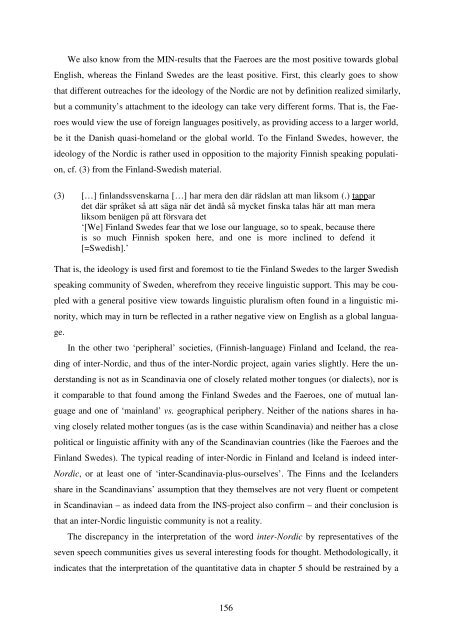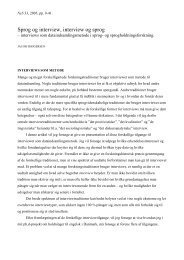Hør dog hvad de siger - Note-to-Self: Trials & Errors
Hør dog hvad de siger - Note-to-Self: Trials & Errors
Hør dog hvad de siger - Note-to-Self: Trials & Errors
Create successful ePaper yourself
Turn your PDF publications into a flip-book with our unique Google optimized e-Paper software.
We also know from the MIN-results that the Faeroes are the most positive <strong>to</strong>wards global<br />
English, whereas the Finland Swe<strong>de</strong>s are the least positive. First, this clearly goes <strong>to</strong> show<br />
that different outreaches for the i<strong>de</strong>ology of the Nordic are not by <strong>de</strong>finition realized similarly,<br />
but a community’s attachment <strong>to</strong> the i<strong>de</strong>ology can take very different forms. That is, the Fae-<br />
roes would view the use of foreign languages positively, as providing access <strong>to</strong> a larger world,<br />
be it the Danish quasi-homeland or the global world. To the Finland Swe<strong>de</strong>s, however, the<br />
i<strong>de</strong>ology of the Nordic is rather used in opposition <strong>to</strong> the majority Finnish speaking populati-<br />
on, cf. (3) from the Finland-Swedish material.<br />
(3) […] finlandssvenskarna […] har mera <strong>de</strong>n där rädslan att man liksom (.) tappar<br />
<strong>de</strong>t där språket så att säga när <strong>de</strong>t ändå så mycket finska talas här att man mera<br />
liksom benägen på att försvara <strong>de</strong>t<br />
‘[We] Finland Swe<strong>de</strong>s fear that we lose our language, so <strong>to</strong> speak, because there<br />
is so much Finnish spoken here, and one is more inclined <strong>to</strong> <strong>de</strong>fend it<br />
[=Swedish].’<br />
That is, the i<strong>de</strong>ology is used first and foremost <strong>to</strong> tie the Finland Swe<strong>de</strong>s <strong>to</strong> the larger Swedish<br />
speaking community of Swe<strong>de</strong>n, wherefrom they receive linguistic support. This may be cou-<br />
pled with a general positive view <strong>to</strong>wards linguistic pluralism often found in a linguistic mi-<br />
nority, which may in turn be reflected in a rather negative view on English as a global langua-<br />
ge.<br />
In the other two ‘peripheral’ societies, (Finnish-language) Finland and Iceland, the rea-<br />
ding of inter-Nordic, and thus of the inter-Nordic project, again varies slightly. Here the un-<br />
<strong>de</strong>rstanding is not as in Scandinavia one of closely related mother <strong>to</strong>ngues (or dialects), nor is<br />
it comparable <strong>to</strong> that found among the Finland Swe<strong>de</strong>s and the Faeroes, one of mutual lan-<br />
guage and one of ‘mainland’ vs. geographical periphery. Neither of the nations shares in ha-<br />
ving closely related mother <strong>to</strong>ngues (as is the case within Scandinavia) and neither has a close<br />
political or linguistic affinity with any of the Scandinavian countries (like the Faeroes and the<br />
Finland Swe<strong>de</strong>s). The typical reading of inter-Nordic in Finland and Iceland is in<strong>de</strong>ed inter-<br />
Nordic, or at least one of ‘inter-Scandinavia-plus-ourselves’. The Finns and the Icelan<strong>de</strong>rs<br />
share in the Scandinavians’ assumption that they themselves are not very fluent or competent<br />
in Scandinavian – as in<strong>de</strong>ed data from the INS-project also confirm – and their conclusion is<br />
that an inter-Nordic linguistic community is not a reality.<br />
The discrepancy in the interpretation of the word inter-Nordic by representatives of the<br />
seven speech communities gives us several interesting foods for thought. Methodologically, it<br />
indicates that the interpretation of the quantitative data in chapter 5 should be restrained by a<br />
156



